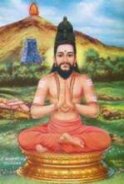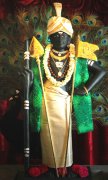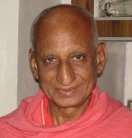

THE ESOTERIC
KANDAR ANUBHUTI
OR
THE SECRET TEACHING ON
GOD-EXPERIENCE
(A Treatise on Adwaitic Realization)
OF
SAINT ARUNAGIRINATHAR

 |  THE ESOTERIC KANDAR ANUBHUTI OR THE SECRET TEACHING ON GOD-EXPERIENCE (A Treatise on Adwaitic Realization) OF SAINT ARUNAGIRINATHAR |  |
 | by N.V. Karthikeyan |  |
| verses contents 40 41 42 43 44 45 46 47 48 49 .. 51 this verse in PDF version (4 parts) p-1 p-2 p-3 p-4 complete download of this book |
VERSE-45 கரவாகிய கல்வியுளார் கடைசென்று இரவாவகை மெய்ப்பொருள் ஈகுவையோ குரவா குமரா குலிசாயுத குஞ் சரவா சிவயோக தயாபரனே.Karavaakiya kalviulaar kadai senru, Iravaa vakai meyipporul eekuvaiyo Kuravaa kumaraa kulisaayutha kunj- Charavaa sivayoga thayaaparane. Not to approach men, who their learning conceal, Commentary Though as a Sadhaka, one's goal is the attainment of that "good" which is God (verse 2), God has a definite mission for him to fulfill when he has attained the Goal. He whom God has made a realised soul (Jivanmukta), from and through him will God naturally get His work done. Thus, the task of spiritual ministering is ordained to the Jivanmukta to whom God has given that experience (verses 42 to 44). The liberated soul who attains to the state of 'Speechless-Experience' (Pesaa Anubhuti) does not usually remain absorbed in it but rises from it and moves about freely. His exalted state is hard to understand and beyond the imagination of ordinary human beings like us. He has a Divine mission to fulfil, that of guiding the aspirants. Just as God came as his Guru and guided him when he was a Sadhaka, God now works through him to minister for the spiritual needs of other seekers or Sadhakas. Hence saints, sages and Jivanmuktas are regarded as representatives of God or moving divinities on earth. Thus he moves about freely, giving spiritual instruction to those that seek his guidance. The instructions and their methods naturally vary in accordance with the needs of those that seek. Hence there is no need for continuity in the ideas of verses 45 to 50. But these verses are of a special type. They are unique and highly instructive. They reveal the exalted spiritual moods and attitudes of a Jivanmukta, who is always in God-awareness, to whom seeking souls resort for guidance; they naturally vary, but form solid advices to seekers. Hence, we will find something peculiar in each of these verses. These verses reveal high spiritual truths. They convey deep meaning and contain secret clues for meditation; they provide valuable guidance to seekers. Hence these are exceptionally grand. The instructions of these verses may be regarded as those of the Jivanmukta or Arunagiri himself or of any saint. Arunagiri exhibits his extraordinary skill of explaining the different types of Yoga to attain the Goal, in theses verses. "O Guru Divine! O Lord Kumara! O Lord wielding the weapon Vajra! O Consort of Deivayani! O Embodiment of Grace Who grants Siva-Yoga! Wilt Thou graciously grant me the Wisdom of the Supreme Reality, so that it may obviate the need to approach and beg at the doors of those who conceal their learning." The Jivanmukta, who has realised God as the Divine Guru, an embodiment of unbounded grace and the granter of Siva-Yoga, feels pity over the lot of those who approach men of learning (bereft of wisdom) who are reluctant to part with their knowledge, instead of seeking from God Who is the repository of Wisdom. Here is, therefore, his exhortation to seekers to pray to the Lord, the granter of Siva-Yoga, for Wisdom. The Lord will see that you get the needed Wisdom either through books, or by Satsanga, or attending some spiritual discourse and will come as the Guru and instruct you at the appropriate time, as mentioned in verse-17. The Jivanmukta's advice to all is to seek Divine Wisdom from God, which is the essence of all learning, to avoid the need to go to and beg of Pundits (or men of learning) who hide their knowledge. It is not that he is against learning, but he disapproves of the idea of approaching those who are unwilling to part with what they possess. Learning is necessary. It is also a gift of God. The learning we have (from books and teachers) and our Knowledge (that dawns from within) are both from the Lord (verse 17). Hence, learning as such is not bad, but learning that loses sight of its purpose at the hands of unspiritual pedantics is what is disapproved by the saint. The great law is: "Give and it shall be given back to you ten-fold, hundred-fold, manifold." Especially in the case of knowledge, one does not lose by giving, for it is such a thing that it cannot diminish by sharing. On the other hand, it increases the more it is imparted, as water from a spring in the river-bed wells up the more it is extracted. Wealth, food, etc., deplete when given to others, and these can satisfy the recipients only for a limited time. But the charity of knowledge (or Jnana-daanam) is a lasting one. Neither the giver loses anything by giving nor the recipient loses it at any time. Both are benefited forever. The glory of Jnana-daanam is, therefore, greater than that of all other charities. Why, then, hide what one knows? Yet, generally men of learning do not easily impart their knowledge to others. They conceal it not knowing that God also hides Himself from them. Why do people hide their learning? They are afraid that their "business" may be affected if they impart it to others. Those who utilise their knowledge as a means of acquiring wealth, position, fame, power, etc., do not wish to impart it to others, lest the latter should compete with them. But the purpose of learning is something else. It is, as Thiruvalluvar says, "To worship (attain) God." Those who direct their knowledge to its true purpose, viz., to attain God, never hesitate to share what they know with honest seekers. Such noble souls are the Gurus, who are kind and compassionate by their very nature, from whom knowledge is to be sought. Pray to the Lord for Wisdom Supreme, for it can be granted by Him alone. Men of learning can give bookish knowledge, i.e., mere information, but not wisdom, for they themselves lack it. After all, one has to go to someone, whether for learning or Wisdom. Then, why go to men; why not pray to the Lord Himself? And how beautifully the Saint contrasts the nature of men of learning with that of the Lord! They hide what they have, though what they possess is not the highest Knowledge, but only bookish learning. On the other hand, the Lord is the granter of Siva-Yoga. Siva-Yoga (or Siva-Jnana) is the supreme state of non-dual consciousness and God alone is capable of giving it. Also, He is an embodiment of grace and mercy. He is ever ready to give to those who really want it, if they approach with sincerity, in the proper manner. One may wonder as to how to approach the Lord for wisdom? Guru is God, we have seen. So the Lord is addressed as Guru, because it is God who comes in a human form in response to one's sincerity and longing, at the appropriate time. God Himself is the real Guru of all. Hence, no distinction is to be made between God and Guru. That God Himself comes as our Guru is known only by those to whom it is revealed by His grace (verse 13). Now, how to recognise a Guru, is the next problem of seekers. On this, Swami Sivananda says: "Here are the characteristics of a real Guru. If you find these qualifications in any man, accept him at once as your Guru. "A real Guru is one who is Brahma-Nishtha (established in Brahman) and a Brahma-Srotriya (well-versed in scriptures). He has full knowledge of the Self and the Vedas. He can dispel the doubts of aspirants. He has equal vision and balanced mind. He is free from Raaga-Dvesha (likes and dislikes), Harsha (joy), Shoka (grief), egoism, anger, lust, greed, moha (attachment), pride, etc. He is an ocean of mercy. In his mere presence, one gets Shanti (peace) and elevation of mind. In his mere presence, all doubts of aspirants are cleared. He does not expect anything from anybody. He has an exemplary character. He is full of joy and bliss. He is in search of real aspirants." "Mere study of books cannot make one a Guru. One who has studied the Vedas and who has direct knowledge of the Atman through Anubhava (experience) can only be enrolled as a Guru. A Jivanmukta (liberated sage) is the real Guru (spiritual preceptor). He is the Sat-Guru. He is identical with Brahman (the Supreme Self). He is a knower of Brahman." Herein also is the difference between learning and Wisdom of Reality. There is a lot of difference between studying under a spiritual master (Guru) and men of learning. As the Guru is a Brahma-Srotriya and a Brahma-Nishtha, apart from his mastery over scriptures, his teachings will have the magical touch of personal experience, as he has already trodden the path, while those of learned men will be dry. Also, doubts and difficulties of various kinds will arise in the course of Sadhana, which have to be cleared then and there. This is possible only for a Guru, as he has undergone them personally. Thus, is the supreme importance of a Guru for seekers of Truth. Guru being God Himself, the contrast made in this verse seems to be between real Gurus who are kind and compassionate and dry Pundits who conceal and are miserly. 'Kumara' means the Lord of eternal youth. It also means one who destroys evils. The Guru is the real Kumara - his beauty consists in his possession of divine wisdom; and he has powers to destroy the evils (Avidya, etc.) of the seeker. 'Kulisa' is a weapon in one of the twelve hands of the Lord. It is with this weapon that the Lord killed the Asura Simhamukhan, the younger brother of Surapadman. As the Lord has the Kulisa weapon, He is Kulisaayudha. Kulisa is also the weapon of Indra. 'Kunjara' means elephant. Deivayanai, the daughter of Indra, was brought up by Indra's divine elephant, Airavata. Hence, she is called Kunjari. As Lord Skanda is the consort of Deivayanai or Kunjari, He is called Kunjarava. Also, as the Lord has an elephant, by name Pinimukha, as His Vahana (vehicle), He is called Kunjarava. Kulisa (or Vajra) is the weapon of Indra, too. Hence, Indra also goes by the name of Kulisaayudha. "Kulisayudha Kunjarava" may, therefore, be taken together, meaning "Lord Skanda, who has as His consort Indra's daughter Kunjari or Deivayanai." One may wonder as to why a reference to Deivayani is made in this verse? Perhaps, because Valli (the Jivatman) has attained the Lord and joined Him (verse-43), where she finds her elder sister with the Lord! It is interesting to note that in the entire work of Kandar Anubhuti, there is reference to Deivayanai in this solitary verse. Perhaps, Arunagirinathar felt that a reference to Deivayanai would make the list of all connected with the Lord and His divine family complete, in the work 'Kandar Anubhuti', as all the others are referred to elsewhere in this work, viz., Lord Siva, Uma Devi, Lord Ganesha, Valli, the Vel, the Peacock and the Cock. |
| contents 40 41 42 43 44 45 46 47 48 49 .. 51 this verse in PDF version (4 parts) p-1 p-2 p-3 p-4 |
| ... www.kaumaram.com ... The website for Lord Murugan and His Devotees முகப்பு கௌமாரம் அட்டவணை மேலே தேடல் home Kaumaram contents top search |
Kaumaram.com is a non-commercial website. This website is a dedication of Love for Lord Murugan. Please take note that Kaumaram.com DOES NOT solicit any funding, DIRECTLY or INDIRECTLY. |